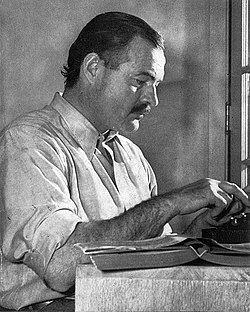Ernest Hemingway Quote
To understand is to forgive. That's not true. Forgiveness has been exaggerated. Forgiveness is a Christian idea and Spain has never been a Christian country. It has always had its own special idol worship within the Church. 'Otra Virgen más'. I suppose that was why they had to destroy the virgins of their enemies. Surely it was deeper with them, with the Spanish religion fanatics, than it was with the people. The people had grown away from the Church because the Church was in the government and the government had always been rotten. This was the only country that the reformation never reached. They were paying for the Inquisition now, all right.
To understand is to forgive. That's not true. Forgiveness has been exaggerated. Forgiveness is a Christian idea and Spain has never been a Christian country. It has always had its own special idol worship within the Church. 'Otra Virgen más'. I suppose that was why they had to destroy the virgins of their enemies. Surely it was deeper with them, with the Spanish religion fanatics, than it was with the people. The people had grown away from the Church because the Church was in the government and the government had always been rotten. This was the only country that the reformation never reached. They were paying for the Inquisition now, all right.
Related Quotes
About Ernest Hemingway
Hemingway was raised in Oak Park, Illinois, a suburb of Chicago. After high school, he spent six months as a reporter for The Kansas City Star before enlisting in the Red Cross. He served as an ambulance driver on the Italian Front in World War I and was seriously wounded by shrapnel in 1918. In 1921, Hemingway moved to Paris, where he worked as a foreign correspondent for the Toronto Star and was influenced by the modernist writers and artists of the "Lost Generation" expatriate community. His debut novel, The Sun Also Rises, was published in 1926. In 1928, Hemingway returned to the U.S., where he settled in Key West, Florida. His experiences during the war supplied material for his 1929 novel A Farewell to Arms.
In 1937, Hemingway went to Spain to cover the Spanish Civil War, which formed the basis for his 1940 novel For Whom the Bell Tolls, written in Havana, Cuba. During World War II, Hemingway was present with Allied troops as a journalist at the Normandy landings and the liberation of Paris. In 1952, his novel The Old Man and the Sea was published to considerable acclaim, and won the Pulitzer Prize for Fiction. On a 1954 trip to Africa, Hemingway was seriously injured in two successive plane crashes, leaving him in pain and ill health for much of the rest of his life. He committed suicide at his house in Ketchum, Idaho, in 1961.
